Development largely depends on how given places participate in global economic processes.The contributions to this book address various features of the integration of sub-Saharan Africa into the world economy via value chains, so as to explain corresponding challenges and opportunities. The book deals with five issues that have not been covered adequately in scientific debates: first, policies are essential to promote value chains and increase their impact on development; second, value chains are diverse, and the variance between them has major economic and political implications; third, regional value chains appear to constitute a viable alternative to global ones (or, at least, are complementary to them), promising better developmental outcomes for the Global South; fourth, political and socio-economic factors are important considerations for a complete assessment of value chains; fifth, cities and city regions are also crucial objects of study in seeking to achieve a comprehensive assessment of value chains.
İçerik tablosu
Introduction.- I Prospects of Regional Value Chains.- II Prospects of Global Value Chains.- III Political and Socio-Economic Challenges.- IV Cities and City Regions in Value Chains.- Conclusion.
Yazar hakkında
Sören Scholvin is a research fellow at the institute of Economic and Cultural Geography, University of Hannover, and an associate researcher at the German Institute of Global and Area Studies. His research interests are world cities and global value chains in the Global South, regional development in sub-Saharan Africa and South America, and the energy policy of emerging economies. From 2015 to 2018, he worked on a research project on ‘Gateway Cities and their Hinterlands’ financed by the German Research Foundations.
Anthony Black is Professor of Economics, University of Cape Town. He currently directs the research unit ‘Policy Research in International Services and Manufacturing’. Anthony has published widely in the fields of industrial policy, the automotive industry, regional integration, foreign direct investment and also employment. He has also acted as an advisor and consultat to a number of African governments as well as international organisations, including the United Nations Conference on Trade and Development and the United Nations Industrial Development Organisation. His latest book is the edited volume
Towards Employment-Intensive Growth in South Africa.
Javier Revilla Diez is Professor of Human Geography at the University of Cologne, and an associate researcher at the Global South Study Center, University of Cologne. His research interests are in global production networks, regional transformation processes and the impact of natural risks on firms, people and regions in East and South East Asia as well as sub-Saharan Africa. Since 2018, Javier has contributed to the research initiative ‘Future Rural Africa’, wherein he concetrate on the desired and undesired socio-economic, effects of economic growth corridors in Namibia and Tanzania.
Ivan Turok is executive director at the Human Sciences Research Council and chairman of the City Planning Commission for Durban. He is also editor-in-chief of the journal Regional Studies and an honorary professor at the University of Glasgow. Ivan’s research covers various aspects of city and regional economic development, labour markets and urban transformation. His latest jointly edited book is
Transitions in Regional Economic Development.












